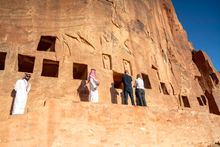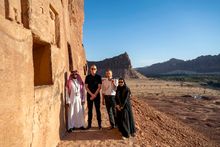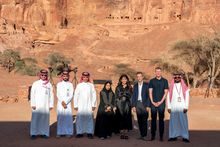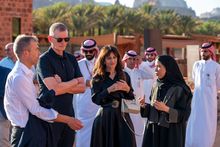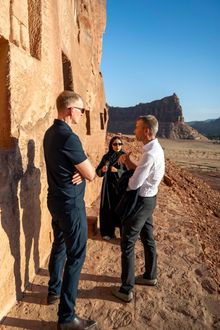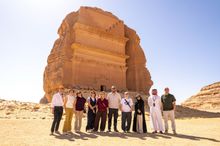 25 Nov 2025
25 Nov 2025
Two of the world's most remarkable open-air heritage destinations, AlUla in north-west Saudi Arabia and Pompeii in southern Italy, have come together in a new collaboration that will redefine how travellers experience the past.
The Royal Commission for AlUla (RCU) recently hosted a high-level delegation from the Archaeological Park of Pompeii (PAP) led by Director Dr. Gabriel Zuchtriegel as part of the Saudi-Italian Cultural Cooperation Framework. The visit marked a deepening of cultural ties between the two UNESCO World Heritage sites and explored how shared expertise can enhance conservation, interpretation, and visitor experience.
Set amid sweeping desert canyons and lush oases, AlUla is a living museum of human civilisation. Its signature site, Hegra, was the first place in Saudi Arabia inscribed on the UNESCO World Heritage List and is home to monumental tombs carved by the Nabataeans more than 2,000 years ago. Surrounding it are ancient kingdoms at Dadan, mystical inscriptions at Jabal Ikmah, and the mudbrick lanes of Old Town, all revealing more than 200,000 years of continuous human history.
Over several days, experts from Pompeii and AlUla exchanged insights on how heritage sites can evolve to meet the expectations of modern travellers while safeguarding authenticity. Workshops and site tours focused on conservation methods, visitor flow, digital storytelling, and sustainable tourism.
Phillip Jones, Chief Tourism Officer at RCU, said the partnership shows how cultural destinations can learn from one another to deliver richer and more meaningful experiences.
“Traveller's today are not just looking at history, they want to feel part of it. Through collaborations like this, we are ensuring that when people walk through Hegra or Pompeii, they connect with the stories, craftsmanship, and cultures that shaped our world. It is about preserving the past while inspiring the traveller of tomorrow.”
The visit also demonstrated the complementary nature of both destinations. While Pompeii represents a moment frozen in time, AlUla tells a story of resilience and continuity, where heritage, landscape, and living culture remain intertwined.
Dr. Abdulrahman Alsuhaibani, Vice President of Cultural at RCU, said this diversity offers powerful opportunities for learning.
“Pompeii's urban archaeology and AlUla's landscape archaeology present two very different approaches to uncovering the past. By combining these perspectives, we are building new methods of conservation and site interpretation that can elevate the visitor experience for years to come.”
Dr. Gabriel Zuchtriegel, Director General of the Archaeological Park of Pompeii, added that collaboration between the two destinations goes beyond science.
“Pompeii and AlUla share a belief that heritage can be a bridge between cultures. We are united by a mission to protect history and to invite visitors to engage with it responsibly, sustainably, and with wonder.”
The RCU-Italy partnership extends far beyond archaeology, encompassing design, craftsmanship, and education. Future projects include the Pompeii G.R.E.E.N. Conference on Sustainable Heritage Management and joint exhibitions celebrating cultural exchange between Saudi Arabia and Italy.
Silvia Barbone, Vice President of Strategic Partnerships at the Royal Commission for AlUla (RCU), said.
“This visit marks the first milestone since our partnership with Pompeii was signed in AlUla in the presence of Prime Minister Giorgia Meloni, symbolizing a new chapter in Saudi-Italian cultural cooperation. Through this collaboration, we will work together on heritage management and enhancing visitor experiences, integrating culture with landscape and agriculture to ensure that heritage remains a living resource, one that continues to educate, inspire, and sustain communities for generations to come.”
For travellers, this collaboration promises more engaging storytelling, advanced conservation techniques, and immersive experiences that bring history vividly to life, whether walking the sun-baked streets of Pompeii or exploring the ancient tombs of Hegra beneath AlUla's desert stars.
-ENDS-
About AlUla:
Located 1,100 km from Riyadh, in North-West Saudi Arabia, AlUla is a place of extraordinary natural and human heritage. The vast area, covering 22,561km², includes a lush oasis valley, towering sandstone mountains and ancient cultural heritage sites dating back thousands of years to when the Lihyan and Nabataean kingdoms reigned.
The most well-known and recognised site in AlUla is Hegra, Saudi Arabia's first UNESCO World Heritage Site. A 52-hectare ancient city, Hegra was the principal southern city of the Nabataean Kingdom and is comprised of 111 well-preserved tombs, many with elaborate facades cut out of the sandstone outcrops surrounding the walled urban settlement.
Current research also suggests Hegra was the most southern outpost of the Roman Empire after the Romans conquered the Nabataeans in 106 CE.
In addition to Hegra, AlUla is also home to ancient Dadan, the capital of the Kingdoms of Dadan and Lihyan, and considered to be one of the most developed 1st millennium BCE cities of the Arabian Peninsula, and Jabal Ikmah, an open-air library of hundreds of inscriptions in many different languages, which has been recently listed on the UNESCO's Memory of the World Register. Also AlUla Old Town Village, a labyrinth of around 900 mudbrick dwellings and buildings, developed from at least the 12th century, which has been selected as one of the World's Best Tourism Villages in 2022 by the UNWTO.
For more information, please visit: experiencealula.com

